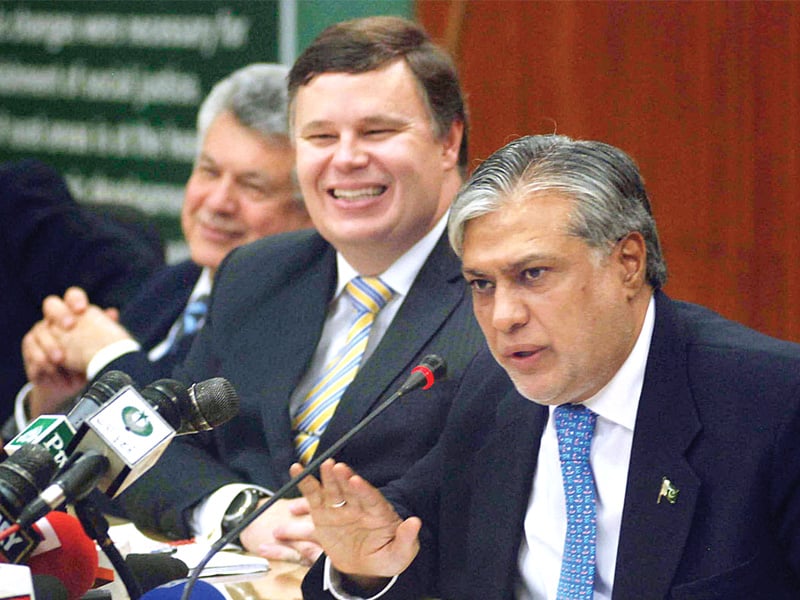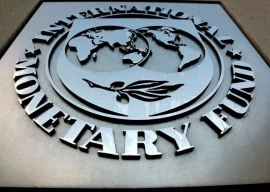
ISLAMABAD:
Pakistan and the International Monetary Fund (IMF) on Saturday announced an agreement on the budget framework for the next year, envisaging fiscal consolidations of Rs290 billion, which will be achieved by levying Rs220 billion in new taxes and reducing power subsidies.
“For the next year, we have agreed to reduce the fiscal deficit to 4.8% of gross domestic product (GDP) from this year’s level of 5.8% of GDP,” IMF’s Mission Chief to Pakistan Jeffery Franks said at a news conference along with Finance Minister Ishaq Dar.
To bridge the deficit, the government will borrow Rs1.4 trillion from domestic and international markets.
A further reduction of 1% of GDP (Rs292 billion) in the budget deficit indicates IMF’s preference for economic stabilisation over economic growth, independent economists said It will be the second year of fiscal stabilisation after steep adjustments, equal to 2.2% of GDP, were implemented in the outgoing fiscal year.
“The mission and the authorities agreed on key revenue and expenditure measures to achieve a further reduction in the fiscal deficit in 2014-15”, said Franks. “Pakistan has made progress in stabilising the economy but more still needs to be done,” he said, adding that IMF has increased its growth forecast for Pakistan to 3.3% from 3.1%. This is still lower than the official target of over 4% though.
Franks said reducing the budget deficit will be achieved by reducing power subsidies and increasing tax base by eliminating statutory regulatory orders (SRO), coupled with other revenue measures. At the same time, though, next year’s budget will provide room for additional development spending, he said.
The IMF mission chief said to lessen the impact of these measures on the poor, IMF and Pakistan have agreed to increase the monthly stipend under Benazir Income Support Programme (BISP) in the new budget.
BISP beneficiaries currently get Rs1,200 per month. Dar said this stipend will be increased at a rate equal to the raise given to the government employees, expected to be 10%, in the next budget.
The finance minister said the first phase of withdrawing tax exemptions will be implemented through the Finance Bill 2014. He said import duties will also be lowered in three years, starting with 2014-15.
On the increase in power tariffs, he said consumers using up to 200 units will be exempted from any further increase. Dar clarified that reduction in power subsidies will also be achieved by reducing line losses and improving recovery. He said the government will not clear circular debt, as it was piling up again due to low electricity bill recovery.
Outgoing fiscal year
Dar and Franks announced the successful completion of the third review of the $6.7 billion loan.
The finance minister said IMF’s net disbursement remained negative by $1 billion during the current fiscal year. While Islamabad is set to receive $2.2 billion in fresh loans, it returned $3.2 billion back, he said.
Franks, meanwhile, said FBR’s collection in this fiscal year will remain below the IMF projections. He said the government recognised an emerging revenue shortfall in April tax collection and was committed to taking necessary compensatory actions.
Dar said further downward revision in the tax target set by IMF was caused by lesser collection of duties on imports due to the strengthening of the rupee. He added that despite the lowering of the tax target, the government will achieve 5.8% of GDP budget deficit target by ‘better expenditure management’ – a veiled reference to slashing the development budget.
Franks said economic indicators were generally improving, with growth gaining momentum, external finance improving, and credit to the private sector rising. He said Pakistan’s programme was broadly on track and it met all end-March 2014 performance criteria with the exception of the target on net domestic assets of the central bank, which was missed by a small margin.
However, the IMF remained concerned about the increase in the rate of inflation. “The IMF mission urged SBP to remain vigilant on recent inflationary pressures in their monetary policy decisions, while continuing their ambitious program to rebuild reserves”, said Franks.
Published in The Express Tribune, May 11th, 2014.
COMMENTS (3)
Comments are moderated and generally will be posted if they are on-topic and not abusive.
For more information, please see our Comments FAQ















































FBR should not give it's staff performance bonus this year as they have failed in performing
Let us see if the amendment that was introduced through SRO in Second Schedule of Income Tax Ordinance 2001, whereby the car monetization allowance allowance of bureaucrats was taxed at 5% is withdrawn. Others pay 20% tax for benefits. If this SRO is withdrawn ,then one would say FBR is serious